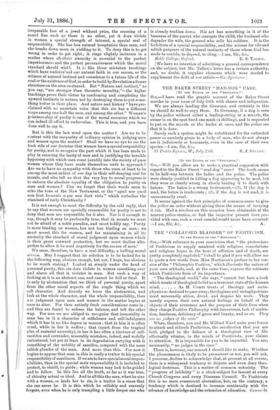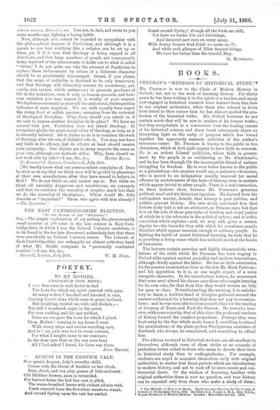THE "COLLAPSED BLADDER" OF POSITIVISM.
[To THE EDITOR OF THE " SPECTATOR." J SIR,—With reference to your conviction that " the pretensions of Positivism to supply mankind with religious consolations and religious hopes in the hour of affliction and of death, are pretty completely exploded," I shall be glad if you will allow me to quote a few words from Miss Martineau's preface to her ver- sion of the "Philosophie Positive," which illustrate the nature of your own attitude, and, at the same time, express the estimate which Positivists form of its importance.
"The theological world," she says, "cannot but hate a book which treats of theological belief as a transient state of the human
mind As M. Comte treats of theology and meta- physics as destined to pass away, theologians and metaphysicians must necessarily abhor, dread, and despise his work. They merely express their own natural feelings on behalf of the objects of their reverence and the purpose of their lives when they charge Positive Philosophy with irreverence, lack of aspira- tion, hardness, deficiency of grace and beauty, and so on. They are no judges of the case."
When, therefore, you and Mr. Wilfred Ward unite your forces to attack and ridicule Positivism, the recollection that you are both pledged to the defence of a theological view of life effectually vitiates, in the minds of Positivists, your claims to attention. It is impossible for you to be impartial. You are, necessarily, "no judges in the case."
There is, however, one remark I should like to make, Whether the phenomenon is likely to be permanent or not, you will not, I presume, decline to acknowledge that, at present at all events, there is a widespread tendency to dispute and even deny theo- logical doctrines. This is a matter of common notoriety. The "progress of infidelity" is a stock-subject for lament at every Church Congress and every Diocesan Council. To Positivists this is no mere evanescent aberration, but, on the contrary, a tendency which is destined to increase continually with the advance of knowledge and the extension of education. Comme science avance, Dieu s'ea va. You are, in fact, asI wrote to you some months ago, fighting a losing battle.
Now, although you cannot be expected to sympathise with the philosophical dogmas of Positivism, and although it is a puzzle to you how anything like a religion can be set up on them, yet if it is true that theology is being sapped in all .directions, and that large numbers of people are consequently being deprived of the inducements it holds out to what is called "virtue," I do not quite see why the attempt of Positivism to replace these inducements by others of a different character should be so persistently discouraged. Grant, if you please, that the reign of infidelity is destined to be only temporary, and that theology will ultimately recover its ascendency, yet, surely, any system which endeavours to promote goodness of life in the meantime, even if only on human grounds, and how- ever mistaken you may regard it, is worthy of your respect. We deplore as earnestly as yourself the anti-social, disintegrating influence of mere negation. We see with equally keen regret the rising flood of selfish passions emerging from the restraint of theological discipline. Why, then, should you attack us if we seek to impose another discipline in its place ? We have no quarrel with you. Positivism does not attack theology. It recognises gladly the great social value of theology, so long as it is sincerely believed. All it claims to do is to continue the work of theology after the era of disbelief sets in. You may not have any faith in its efficacy, but its efforts at least should receive your sympathy. Our objects are in many respects the same as your own, although our methods differ. Why, then, should we not work side by side ?—I am, Sir, &c., HENRY ELLIS.
25 Brunswick Square, Camberwell, July 24th.
[We hardly know what our correspondent complains of. Does he wish us to say that we think men will be guided by phantoms of their own manufacture, after they have ceased to believe in God ? We do not think so, and cannot say so. But while we think all unreality dangerous and mischievous, we expressly said that we condemn the unreality of sceptics much less than we do the unreality of theologians. Whom would Mr. Ellis describe as "impartial ?" Those who agree with him already ? —ED. Spectator.]



































 Previous page
Previous page